Are you ready to kick your oil infusion skills up a notch? An alcohol intermediary oil infusion harnessing the solvent powers of alcohol might sound a bit intimidating, but it’s surprisingly simple to do.
Before we get to the hows of making an alcohol intermediary oil infusion, let’s take a quick look into the whys.
First, some essential resources
Creating an effective herbal infusion depends on matching your herb’s constituents with their preferred solvent(s). In chemistry, like dissolves like, so it’s useful to know a little about solvent polarity and the corresponding polarity of different plant constituents. But when you’re working with a whole herb, you’ve got something a lot more complex and synergistic than a simple isolated constituent, so these concepts become generalities rather than hard-fast rules.
Fortunately, there’s a whole lotta of resources out there that can help you to figure out which solvents are most effective at extracting what constituent — without revisiting your sophomore year chemistry class.
It’s essential to have trusted source (or two) for determining the specific phytochemicals in the herbs you’re working with. I bounce back and forth between David Hoffman’s Medical Herbalism: The Science Principles and Practices Of Herbal Medicine and Kerry Bone’s Principles and Practice of Phytotherapy: Modern Herbal Medicine. Both books contain extensive, detailed herbal monographs, including a list of primary constituents for each herb. If I can’t find an herb in one book, I’ll almost certainly find it in the other.
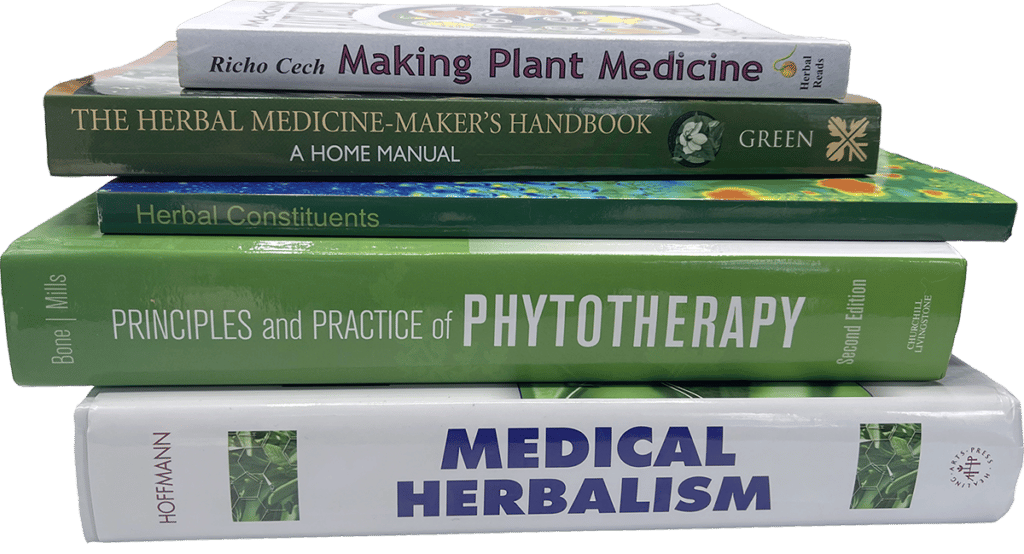
Now that we know the primary phytochemicals in our herb, which solvent(s) are best to pull them out? Richo Cech has a helpful section in chapter 5 of his book Making Plant Medicine, “Solubility Factors” that covers some major categories of constituents such as alkaloids, volatile (essential) oils, polysaccharides, resins, etc., examples of herbs that contain them, and what solvents will best extract these constituents. There’s also an extensive chapter on Solvents and which constituents they affect in James Green’s The Herbal Medicine Maker’s Handbook.
For the more advanced herbalist, if you really want to geek out on the chemistry of herbal constituents, Lisa Ganora’s Herbal Constituents: Foundations of Phytochemistry is a goldmine of information. While it’s a good mix of conversational and technical writing, be warned that this is a chemistry text book and is definitely not light reading.
For even more happy geek time, check out this fabulous solubility flowchart that illustrates what solvents extract which plant constituents, adapted from Lisa Ganora’s book and The Modern Herbal Dispensatory by Thomas Easley and Steven Horne and The Herbal Medicine-Maker’s Handbook by James Green.
I just wish I knew who created the flowchart. If anyone knows, please let me know in the comments so I can give them credit!
Solvents & solubility
When you infuse an herb in oil, it will draw out some the oil-soluble bits such as gums and resins, some of the volatile oils, certain oil-soluble vitamins (A, D, E, K), plant sterols and terpenes (oil-soluble carotenoids give plants their orange or yellow pigment).
A vibrant red (fresh) St. John’s wort-infused jojoba oil:
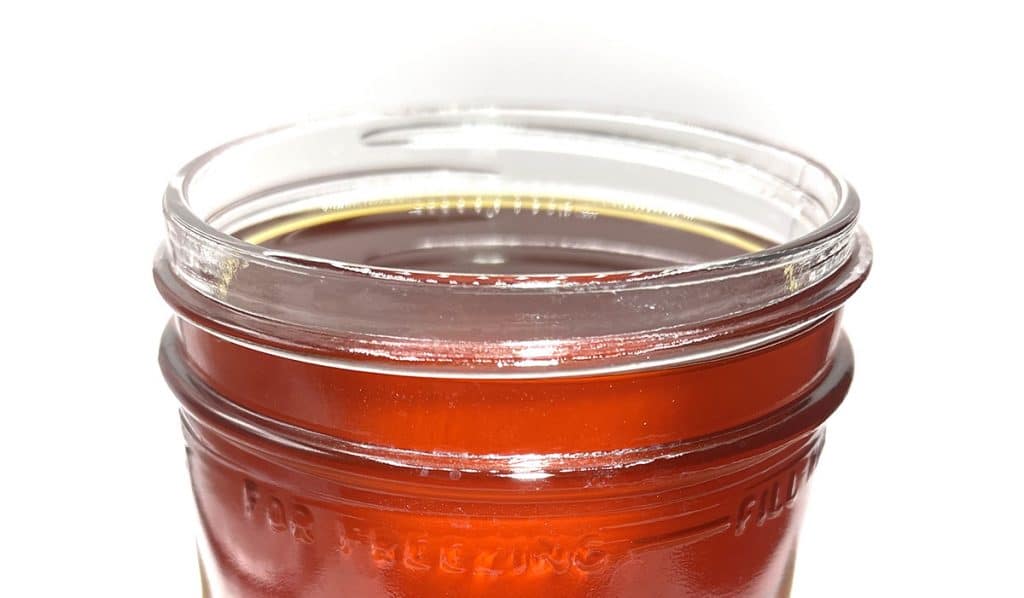
Compared to alcohol, water and vinegar, though, oil is a relatively weak solvent. Adding a bit of alcohol to the process will free more of a plant’s alkaloids, resins, flavonoids, glycosides, terpenes and volatile oils, camphors and vitamins. Alcohol also tends to do a better job of capturing certain plant pigments. Chlorophyll, for example, is captured quite well by ethyl alcohol, giving your infused oil a more vibrant color vs. one made without the alcohol intermediary step.
Alcohol intermediary
So to draw out a more complete array of constituents in an oil maceration, ethyl alcohol can be used to do a quick pre-infusion before covering the herbs in oil. This added step draws out the alcohol soluble constituents in addition to the oil soluble ones, effectively increasing your infused oil’s potency.
Simply place your dried herbs in the vessel you’re going to use for the oil infusion. If the herb is in larger chunks, grind or crush into smaller bits using a coffee grinder or mortar and pestle. Barely moisten the herbs with a shallow layer of high-proof grain alcohol (the highest you can find, preferably 190 proof *). Stay away from isopropyl alcohol, though — the smell, even after maceration, will be overpowering.
Pro tip: An easy way to evenly moisten the herbs without drenching them is to place your alcohol in a clean spray bottle and mist the herbs until barely moist.

Loosely cover the jar/vessel with a lid or use a rubber band to secure a scrap of cheesecloth, and allow the herbs and alcohol do its thing overnight.
(ETA: I usually cover my maceration with cheesecloth and a rubber band during the alcohol stage, but I did have one person report browning/ oxidation happening to her fresh comfrey when she did the alcohol maceration, so it might not be a bad idea to use an airtight cover during that step to reduce oxygen exposure — and the risk of oxidation.)
In the morning, and you can proceed with a normal oil infusion. The alcohol intermediary method benefits from a heated oil infusion method, because the heat will ensure that the last bits of alcohol and water evaporate out. This is particularly true if you used a lower proof alcohol. 151-proof Everclear is about 75% alcohol, which means the remaining 25% is water, and you really don’t want water in your final infused oil.
Remember to leave the lid off or vented during the heated infusion stage to allow for evaporation of any alcohol and moisture remaining in the oil.
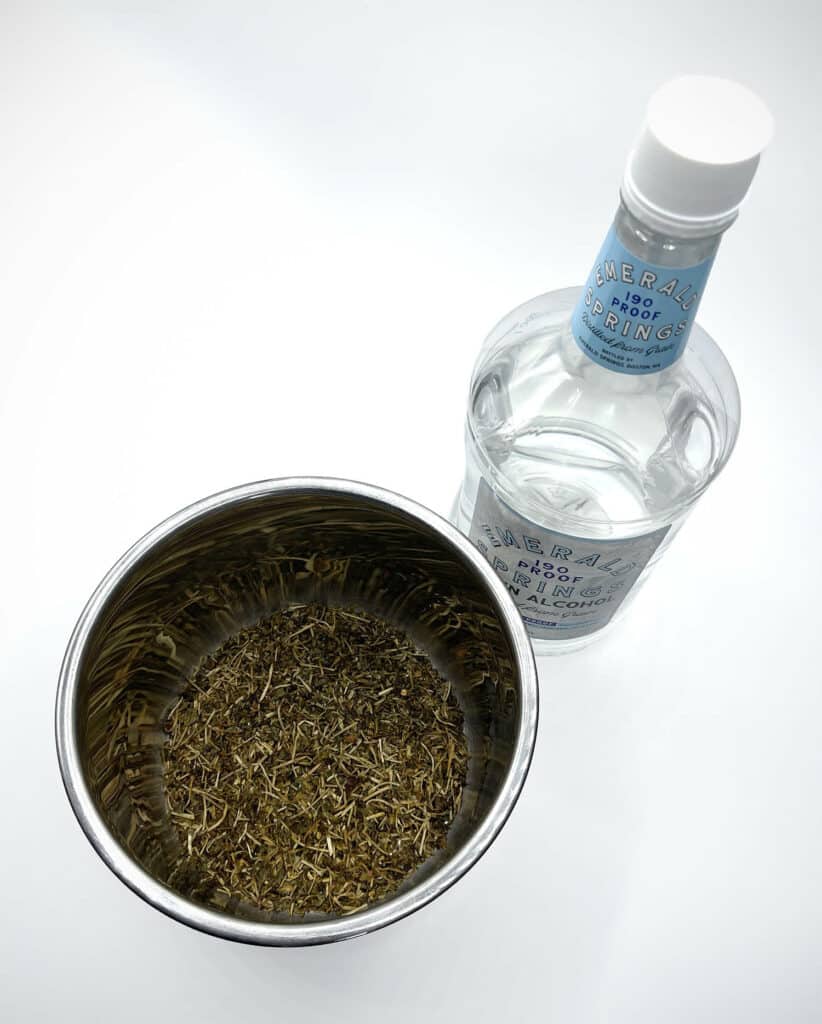
In addition to the added potency, an alcohol intermediary infusion done correctly should also improve your infused oil’s shelf life. There should be no appreciable alcohol content left in the oil once the oil maceration is complete, but the extra alcohol step reduces the microbes introduced into the oil.
Remember to label your jar with the herb, type of oil used and date (a note about it being an intermediary infusion might also be useful) and store in a dark, climate controlled location. It should last well beyond the estimated 2-year lifespan of a regular dried herb-infused oil.
* We can’t buy 190-proof anything here in Idaho, but I’m fortunate that we live within a pretty easy drive to the Washington border, where 190-proof spirits are a thing. Each time I pick up a few bottles of 190-proof Everclear, I always feel compelled to make sure the checkout clerk understands that I’m NOT drinking it, I swear! I’m not that kind of an alcoholic thankyouverymuch… I’m TINCTURING! ☺

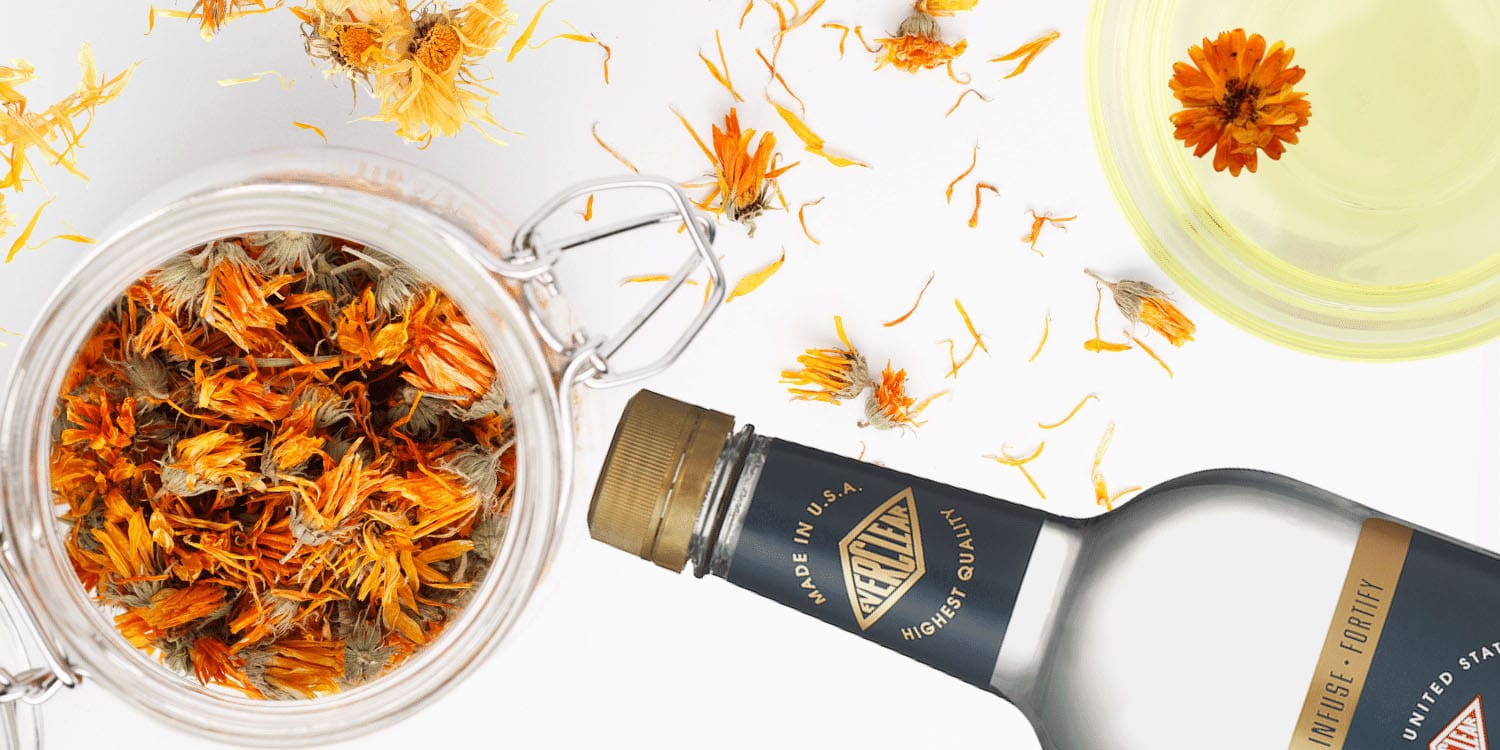
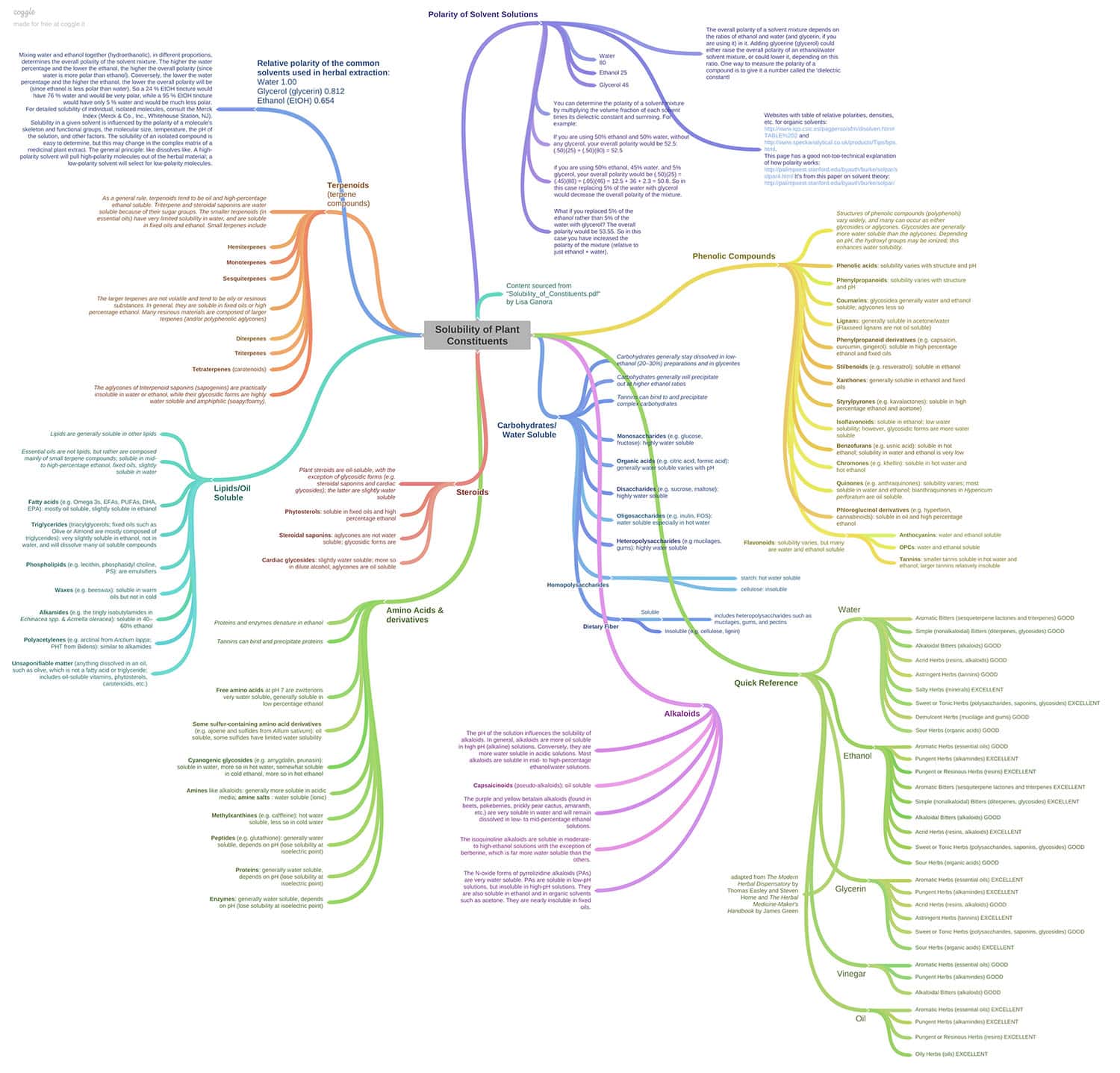


24 Responses
Thank you for this!! I was wondering if you leave the cover off or on during the heated oil infusion? My plan was to place the in my dehydrator at a temp between 100-105 F and wasn’t sure. Thanks I’m advance for any further imparted knowledge🌻
Hi Stefanie! Yes, when doing a heated oil infusion, definitely leave the cover off (or at least vented) to allow evaporation of any remaining moisture in the alcohol or herbs. Your intuition is spot on! Using a dehydrator is a great idea too. 100-105 F is a good range for preserving the quality of the herbs and preventing them from overheating or burning.
I’m looking at making a marijuana infused oil using this method but only have access to 40% alcohol. Question 1… do I still need to decarb the herbs and question 2. Will there be too muvh water from the 40% alcohol or will I manage to burn this off if I heat it in a slow cooker or rice cooler. I’m worried the water content may reduce the shelf life of my balms. I’d appreciate any suggestions. Thanks
Hi Linda! I don’t have any direct experience working with THC (since it’s not legal in my state) but my understanding is that you can decarb the herb at the same time it’s infusing in oil – the decarboxylation process will just take a bit longer, since oil acts as a buffer and can slow down the conversion of THCA to THC. Ideally, you’d want to use a high-proof alcohol, such as Everclear for your intermediary oil infusion to better extract the resinous compounds and minimize the water content in your balm, but you may be able to get away with using 40% alcohol if you heat the oil infusion low and slow for a longer period of time to evaporate the water content (which you would be doing anyway for the decarbing process). Be sure to leave the lid off your slow cooker to allow the water to escape. Good luck!
I have the same problem as above, access to approx 75% alcohol
I fail to logically see how water can evaporate at such a low temperature. Can’t water only evaporate at 100 degrees Celsius?
Will the water actually evaporate slow boiling at lower temps?
Thanks
Davy
Hi Davy! While it’s true that water’s boiling point is 100C (212F), evaporation can occur at lower temperatures. Water molecules can escape from the liquid phase and enter the air as vapor at room temperature, although the rate of evaporation will be much slower than when heat is applied. Low heat (that won’t denature your herb) will speed up this process.
Hello, i did this method with calendula/tallow but i believe i added too much alcohol. the water bath went 12 hours and was at 150 degrees at its highest but i can still smell alcohol pretty strong in the oil. Should I leave it alone and continue the process or should i try to increase heat to try to burn off the remaining alcohol. I’m not sure how high i can go with heat in water bath before it will damage the medicinal properties of the plant. Thanks so much and I love your site!!
Hey Lisa, Thanks so much for the kind words! I would leave the temperature on the lower side (you really don’t want the oil itself to heat much beyond 110-115 or so) and continue your water bath infusion until all of the alcohol has evaporated. (Good job letting you nose be your guide to determine when the infusion is actually “done”!)
Richo Cech recommends that fresh herbs be infused for a full week and 2 weeks for dried herbs, so your infusion may benefit from a longer maceration time to evaporate the remaining alcohol. If you used a lower proof alcohol (like 151 Everclear) it could take a bit longer. Good luck ♥
Hi There,
I have been following the instructions from Mountain Rose Herbs on doing an alcohol intermediary oil infusion method using a blender. You soak the alcohol and herbs overnight and then the next day blend them in oil for 5 minutes using a blender-the oil gets warm. I was wondering if you had done this before and what your success rate was. I have a dehydrator and could easily use that after the overnight soak. How long do you recommend dehydrating the herb/oil mixture (top off)? I really was looking to see if one way was better than the other or maybe if it was just the same. Thanks in advance for your help. I am appreciative of the information.
Libby
Hi Libby! The blender method works extremely well (you can read my version of this process here: https://redheadedherbalist.com/a-simple-way-to-supercharge-your-tinctures-oil-infusions/ A Simple Way to Supercharge Your Tinctures & Oil Infusions).
Most of the details are similar, though I would add that using a very high proof alcohol is important – 151 minimum and 190 if you have access to it. It’s so much easier to get the water out if there’s not a ton there to begin with. Good thinking about following up with the dehydrator. If I used a lower proof alcohol and/or fresh plant material, I’ll transfer the macerated oil to a jar inside my dehydrator cabinet, and hold it (uncovered) at ~110F for another day or two, just to be certain all of the moisture is evaporated out of the oil. The dehydrator step doesn’t hurt anything and it gives you peace of mind that the moisture is completely gone. I’ve been using this method (even with fresh plant material) for about a year now, and haven’t had any oils go moldy.
I hope this helps! Please let me know how yours turns out! ♥
Hello! Thank you for this great blog post! I love the amount of details that you provide and the books you mentioned. I would like to try the Alcohol Intermediary Herb-infused Oil method you describe on this blog post. I plan to use the herb-infused oils for skincare products for the face and I want to ensure that no alcohol or water remains in the oil infusion. Other than the smell test, is there anything else I could to to test if water or alcohol remain after 2 weeks of infusing the oil at low heat?
Thank you very much!
Che
Thank you so much for the kind words, Che! I have never tried to measure residual alcohol content in my infused oils. I always use 190-proof, so there’s minimal water to deal with. If you’re concerned, you might try letting the alcohol part of the alcohol intermediary infusion sit a bit longer before adding it to the oil. 2 weeks at low heat should be more than enough time to allow any residual water content to evaporate out of your oil. As far as measuring goes, I don’t have any direct experience with these tools, but you might have luck with a specialty hydrometer designed for oil products such as this one. Good luck, and if you find an accessible solution, please report back!
Thank you very much, Redheaded Herbalist (btw, I love your name!)! This information is very helpful. I will let you know if I find any cost-effective and practical way to test for any residual alcohol content. In California I can only get 75.5% alcohol. Would letting the alcohol intermediary infusion sit 3-4 days be too long? If I let it sit for too long, would I lose the properties extracted by the alcohol? (can they evaporate?)
Thank you very much!!
It depends on the herb and the constituents you’re trying to extract. You probably would risk losing *some* of the herb’s volatile constituents (like terpenes or phenolic compounds) the longer it sits. And, unfortunately, measures that minimize the loss of volatile compounds would also slow down the evaporation of water from the alcohol. Of course, if you’re primarily interested in capturing something like resin from the herb, then evaporation is less of a concern.
Thank you very much!! Since higher proof alcohol is not sold in my state, I believe another option for me would be to use undenatured alcohol. Do you have any experience with that?
Also, could the intermediary method be used with glycerin instead of oils?
Thank you very much!
I just made an infusion of lavender and oil using my ne Hello Hi device. I think it’s intended use I’d to infuse marijuana. However, I used it for my herbs and used the alcohol method. I think I put too much in the formulation. What can I do. It does smell of alcohol. The machine has a de carb setts which I will later use instead of the alcohol to determine the difference. In the meantime do I throughout or try to salvage my infuse and how much of my valuable properties have I lost. I was making for my grandson who suffers from eczema. Please help a new herbal beginner. Thank you!
Hi Eretta, I would allow the infusion to sit uncovered for a bit longer to allow the alcohol more time to evaporate. It might take a while, but alcohol is volatile, so it will evaporate eventually. You can try holding the infusion at a low temperature (also uncovered) to speed up the evaporation process. Avoid overheating it, though, since the volatile aromatic compounds in lavender will also evaporate. Keep it under 110F, and see if the scent improves. Good luck! ♥
I am trying the alcohol method and using 91% isopropyl since that’s the best I have. I let it sit in a jar (with a plastic lid on it) overnight thinking that the alcohol was not supposed to evaporate until it had done its work. I have two questions.
1. Should I take the lid off and just cover it with cheesecloth so more alcohol can evaporate BEFORE I add in the oil? Is there any reason that this would be bad for the end product?
2. Is the BLENDER step necessary, or can I simply stir in the oil and then do the warming process? When using the vitamix, it is impossible to get everything out so you lose a lot of the oil. Versus just adding the oil to the jar the herbs are already in. Does that make sense? I already crushed my herbs (comfrey) really well before adding the alcohol. While I’m sure that blending in the vitamix would break them down more, it seems like it would also make it next to impossible to strain all plant stuff out without using a lot o absorbent filter material which will also reduce the amount of oil for the finished product.
Hi Nancy! Since our goal is to have an infused oil with no remaining water OR alcohol left in it, you do want to allow for evaporation. I usually cover with cheesecloth and a rubber band during the alcohol stage, but I did have one person report browning/oxidation happening to her comfrey when she did the alcohol maceration, so it might not be a bad idea to use an airtight cover during that step to reduce oxygen exposure (and the risk of oxidation). In order to get the rest of the alcohol/water out of your preparation, though, you’ll need to apply gentle heat (no more than 100F) for a day or two to encourage the remaining water/alcohol to evaporate out of the oil.
The blender step is not at all necessary – it simply speeds up the process. You can make a perfectly good alcohol intermediary oil infusion using any of the methods described here: https://redheadedherbalist.com/making-herbal-oil-infusions/
Thanks for the response! I ended up not blending it. And I left it out for ages to try to evaporate more alcohol. I did heat in a double boiler, not boiling though, just to warm and help evaporate. And it took ages to strain, so it sat open while straining. I didn’t end up having time to make salve yet, so I just put the oil in the fridge. It still smelled a bit of alcohol, but I decided not to worry about it. It is SO bright/intense colored, which is really fun.
I’m wondering if there is a bare minimum time to keep dry herbs in the alcohol. I was wanting to do an oil infusion ready tonight with a magical butter maker. So just like a 3 hour heat/infuse time. But I just mixed with the alcohol then thought oh, how short of time can I do with the alcohol…. Any suggestions? I may have to wait overnight but wondered…🤪 Margaret
Hi Margaret! It doesn’t have to be overnight. If you’re in a rush, even 30 minutes of an alcohol pre-treatment can help to break down plant cell walls and begin extracting medicinal compounds. And since you’re using the MagicalButter Machine, the heat should take care of any residual alcohol.
Thank you for writing this. Appreciate you sharing your knowledge. If you sell the herbal infusion by itself, or use it in salves, balms etc., do you add ethyl alcohol in the ingredients list?
I don’t have a dehydrator. Can I leave the alcohol treated herbs in the oven instead of a water heat bath? What temp is best? Thank you